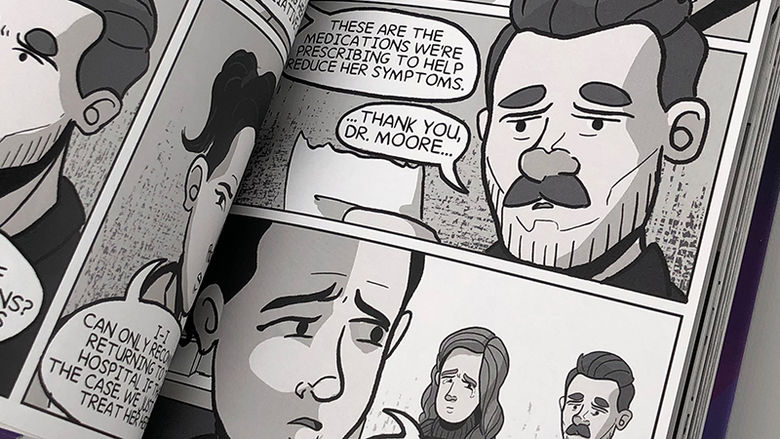Program Description
Penn State Altoona's Multidisciplinary Studies program is a multi-disciplinary, self-designed program leading to a Bachelor of Arts degree. Students who pursue an Multidisciplinary Studies major select a group of courses focused around a particular topic, idea, or issue that they wish to explore.
Recent examples of students' Multidisciplinary Studies themes include the following: Counseling and Psychology, The Development of Early American Culture, Liberal Arts and Entrepreneurship, History of Human Thought and Belief, Communication and Culture, Science Education and Administration, Political Science and Communication, The Impact of Psychological Development on the Family, Humanities Education, Engineering Management, and Environmental and Science Writing.
Learning Objectives—Curricular Requirements
The Multidisciplinary Studies major is a 36-credit program.
In order for students to acquire the necessary skills to succeed in a variety of careers or graduate/professional school, they must take 12 credits in each of the following cognitive areas, as described below:
- Research Methods/Projects
Such courses include all classes numbered 294/494, all laboratory courses, all statistical analysis courses, all research methodology courses, all Computer Science courses, and all Information Systems courses. - Communication Skills
Such courses include: speaking, writing, acting, production of the fine arts, signing, and symbolic logic. - Theory/Application
Such courses include: theory, major figures, basic problems, and basic principles. - Critical Analysis
Such courses include most Math and most 400-level literature, philosophy, and history courses, and courses that emphasize criticism, comparative studies, and policy analysis.
The remaining 24 credits of the Multidisciplinary Studies program are to be taken as follows:
- 15 credits at the 400-level, with at least one course in each of the three focus areas.
- 9 credits of additional selections from the three subject areas.
Learning Objectives—The Academic Plan
In order to explain and defend their individual learning objectives, students will write an Academic Plan during their fifth semester, or if part-time, after completing 60 credits. This Plan (as outlined below) will describe student's individualized Multidisciplinary Studies learning objectives.
[Note: Samples of recent students' Academic Plans are attached.]
- Statement of Focus and Theme
Students will list the option they have chosen and the three academic subjects on which their academic course of study is based. In this section students will explain their areas of focus, discuss the types of knowledge and skills they plan to acquire, and state the learning objectives they have for their education. - Primary Areas of Coursework
Students will list the specific courses they plan to take their major courses; and they will explain how these courses fit into their program of study. - Internships and Independent Studies
Students will discuss the types of independent study or internship opportunities that they plan to pursue and explain how such experiences will complement their Multidisciplinary Studies program. - Career and Academic Goals
Students will describe their professional, academic, or other career goals, and will explain how the course of study they have designed prepares them to meet these goals.
Following is a sample of the courses that can be used to achieve program objectives.
Course Matrix
I. Program Objective: 12 credits in Core Requirements
3 credits, Research Methods/Projects: Upon completion of 3 credits in courses that involve research methodology or that focus on a research project relevant to their plans of study, students will:
- Be able to apply a specific research methodology and/or computer programming method to their chosen field of study.
- Be familiar with the primary journals and other research sources in their chosen field.
- Be able to use the internet and the library to locate research sources for a specific topic.
- Be able to organize and classify the results of their research findings in a written, oral, or computer database project.
- Be able to document their research using one of the standard citation methods: MLA, APA, or Chicago Style.
Sample of courses that achieve the above objectives:
- BA 395W, 495B
- CAS 220, 295, 296, 401
- COMM 241, 404, 461
- CSE 103, 120
- DANCE 296/496, 381, 480, 485
- ENGL 221W, 414, 487W
- ENV ST 200
- HDFS 229, 312W
- HIST 302W
- INART 294, 494
- MKTG 190, 342
- MUSIC 442
- PSY 201W
- SOC 7, 406, 424
3 credits, Communication Skills: Upon completion of 3 credits in courses that focus on expression, including those in verbal, symbolic, and written skills that are relevant to their plans of study, students will:
- Know the different modes of rhetorical communication.
- Be able to apply in a presentation to an audience the basic principles of clear, persuasive, and rhetorically driven oral communication.
- Be able to write well-developed, organized, and coherent documents relevant to their chosen field, i.e., letters, memos, reports, proposals, critical analyses, résumés, technical instructions.
- Understand the principles for deciding when to choose a verbal or written format to deliver a particular communication message.
Sample of courses that achieve the above objectives:
- ART 100, 111, 111S, 120, 290, 391, 297A, 494
- BA 321, 322, 422W
- CAS 404, 450W, 452
- CN ED 404
- COMM 260W, 269, 360, 425, 430, 446, 460W, 462, 464W
- DANCE 280, 381, 480, 485
- ENGL 212, 213, 215, 417, 418, 419
- GER 201,
- INART 214, 296, 297B, 297C, 297D, 297E, 494, 496, 397A, 497B, 497C
- PHIL 12, 212
- RUS 204
- SPAN 200, 412, 420
- THEA 102, 322
3 credits, Critical Analysis: Upon completion of 3 credits in courses that focus on evaluation, synthesis, and analysis, students will:
- Learn and understand how to evaluate, analyze, and assess topics in their field.
- Be able to formulate a critical framework upon which to focus a critical inquiry.
- Be able to make a balanced, coherent comparison of two or more issues within their field.
- Understand the basis upon which ideas are evaluated critically and upon which decisions are made within their discipline.
Sample of courses that achieve the above objectives:
- ACCTG 211
- BA 243, 250, 422W
- BIOL 401, 403, 405, 430, 448
- CAS 220, 402, 412
- CJ 450W, 460
- CN ED 416
- COMM 205, 408, 409, 411, 418, 450, 455
- DANCE 484
- ECON 2, 4, 315, 351
- ED THP 412
- ENGL 100, 200, 411
- ENV ST 400, 444
- FIN 301
- GEOG 406, 419, 420W
- HDFS 312, 312W
- HIST 101, 107, 110, 116, 120, 121, 122, 123, 142, 143, 151, 152
- IET 105
- KINES 345
- LIR 100
- MKTG 221W, 464W
- PHIL 10, 12
- PL SC 3, 135, 419, 420, 425, 430, 456
- PSY 237, 414
- RL ST 101, 124
- SOC 13, 103, 109, 119, 430, 424
- SPAN 415
- WMST 452, 453, 462, 490
3 credits, Theory/Application: Upon completion of 3 credits in courses that focus on theory, principle, central concepts, or fundamental issues in a disciplinary group, students will:
- Be able to identify and explain the various theoretical models within their chosen fields.
- Be able to apply different theories within their specific discipline in order to produce a written, an oral, or other type of project that evidences their application of a theoretical model to a subject within their field.
Sample of courses that achieve the above objectives:
- ART 1, 10, 20, 90, 201
- BIOL 450W
- CAS 201, 202, 352, 404, 450W, 460
- CJ 100, 420, 497B, 497C
- CN ED 401, 403, 410
- COMM 250, 337, 353, 455, 464W, 480
- DANCE 270, 301, 482
- ECON 14
- ED THP 115
- EE 459
- ENGL 200, 404, 412, 470, 474, 482, 483
- GEOG 30
- HDFS 411, 418, 429, 445
- HIST 419, 422
- INART 1, 10, 115, 210, 494, 496, 397A
- MGMT 301
- MKTG 221W, 301, 330
- PHIL 2, 103(W), 403
- PHYS 237
- PL SC 1, 3, 14, 17W, 417, 430, 456
- PSY 170, 243, 412, 430, 437
- SOC 5, 12, 30, 110, 405, 406
- STAT 415
- WMST 110, 301, 419, 422
II. Program Objective, 15 credits of 400-level Courses
III. Program Objective, 9 credits of Additional Selections
Depending on an individual student's Multidisciplinary Studies program and selected subjects of focus, conceivably any course offered at PSU Altoona can meet the above program objectives.
The attached student Academic Plans provide examples of how individual Multidisciplinary Studies students have met the preceding program objectives by taking specific courses within their focus areas.




